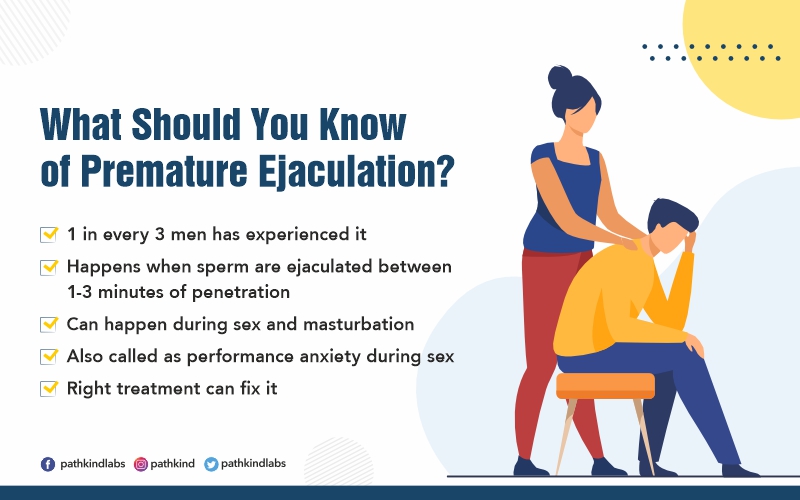Premature ejaculation (PE) is one of the most common sexual health concerns for men, yet it’s often misunderstood or overlooked. Understanding premature ejaculation can ease the anxiety surrounding it and provide a clear path forward. In this guide, we’ll explore its causes, discuss neurobiological and psychological factors, and review effective solutions ranging from home remedies to professional support.
What is Premature Ejaculation?
Before we can tackle the problem, it’s important to define it. Understanding premature ejaculation starts with knowing that PE happens when ejaculation occurs sooner than desired, often within a minute or two of penetration or even before intercourse begins. This can lead to feelings of frustration, disappointment, or embarrassment for both partners. While occasional early ejaculation is normal, recurring instances may signal a deeper issue that needs attention. (Source)

[Source: aadar.co]
Causes of Premature Ejaculation
Understanding premature ejaculation involves exploring the different reasons it can happen. These causes are rarely one-dimensional; instead, they often combine psychological, emotional, and physical factors. Knowing what triggers PE is essential for choosing the right solution and regaining control.
Psychological Factors
Psychological elements play a major role in understanding premature ejaculation. Emotions like anxiety, stress, or unresolved relationship issues can influence sexual performance more than many realize. When your mind is preoccupied or overwhelmed, it can disrupt the natural flow of intimacy. Addressing these mental and emotional factors is often the first step toward lasting improvement.
-
Performance Anxiety: Worrying about meeting a partner’s expectations or fearing failure can heighten arousal levels, shortening control over ejaculation. Over time, this cycle of anxiety and anticipation can reinforce premature responses.
-
Relationship Issues: Conflicts, emotional distance, or poor communication in a relationship can create tension during intimacy, which can directly influence sexual performance.
-
Psychological Trauma: Past experiences such as sexual abuse or other trauma can leave lasting emotional scars. These memories may surface unconsciously during intimacy, triggering premature responses.
(source)
Hormonal and Neurochemical Factors
Your body’s chemical balance is just as important as your mindset when it comes to understanding premature ejaculation. Hormones and neurotransmitters like serotonin and testosterone regulate arousal and climax. When these levels are disrupted or imbalanced, it can lead to faster ejaculation. Recognizing and addressing these physical influences can make solutions far more effective.
-
Serotonin Levels: Serotonin is a neurotransmitter that helps regulate mood and delay ejaculation. Low serotonin levels can make it more difficult to control climax, leading to quicker release.
-
Hormonal Imbalances: Conditions like low testosterone or thyroid disorders can disrupt hormone balance, reducing sexual stamina and increasing PE risk. (Source)
Neurobiological Factors
Sometimes, the roots of PE are biological rather than emotional. Understanding premature ejaculation also means recognizing that your nervous system and genetic makeup can play powerful roles. If these biological elements are at play, self-blame should be replaced with knowledge and practical solutions.
-
Genetic Predisposition: Some men are naturally more sensitive due to inherited traits that influence their ejaculatory reflex. This means the condition isn’t always a matter of willpower or technique. (Source)
-
Nervous System Response: The sympathetic and parasympathetic nervous systems regulate sexual arousal and climax. An overactive or hypersensitive nervous system can accelerate arousal signals, making control more difficult. (Source)
Solutions for Premature Ejaculation
There is no one-size-fits-all answer, but understanding premature ejaculation opens the door to proven strategies. From behavioral methods to medical interventions, a multi-pronged approach often works best.
Behavioral Techniques
When it comes to understanding premature ejaculation, simple changes in technique can make a remarkable difference. Behavioral methods focus on training your body to respond differently during sexual activity. These techniques are practical, non-invasive, and can be practiced at home with patience and consistency.
-
Start-Stop Technique: During sexual activity, pause stimulation just before ejaculation. Allow arousal to decrease slightly, then resume. Over time, this method trains the body to maintain control longer.
-
Squeeze Technique: Applying firm but gentle pressure to the base or tip of the penis can momentarily reduce arousal, delaying climax. Practicing this technique helps build confidence and awareness.
-
Pelvic Floor Exercises: Strengthening pelvic muscles with Kegel exercises can improve control over ejaculation and enhance overall sexual performance. Consistency is key to seeing results.
(Source)
Psychological Interventions
Sometimes, the mind can be the biggest obstacle in intimacy. Understanding premature ejaculation means recognizing the impact of stress, anxiety, and thought patterns on sexual performance. Psychological strategies target these underlying mental and emotional factors to build confidence and reduce pressure.
-
Cognitive Behavioral Therapy (CBT): CBT helps identify and challenge negative thought patterns or fears that contribute to PE. Addressing these anxieties can significantly improve sexual performance and satisfaction.
-
Mindfulness & Relaxation: Practices like meditation, deep breathing, and progressive muscle relaxation lower stress, keeping the mind and body calm during intimacy.
(Source)
Medical Interventions
In some cases, lifestyle changes alone may not be enough. Understanding premature ejaculation also means being aware of medical options that can provide additional support. These treatments—ranging from topical solutions to prescription medications—can be combined with behavioral methods for optimal results.
-
Topical Anesthetics: Numbing creams or sprays reduce penile sensitivity, offering more time before climax. (Source)
-
Selective Serotonin Reuptake Inhibitors (SSRIs): Certain antidepressants delay ejaculation by increasing serotonin activity. (Source)
-
Combined Therapy: Pairing behavioral techniques with medical treatments can produce long-term improvement. (Source)
-
Incorporate Supplements: Testosterone-boosting supplements like Healeo’s Testo Forte can support endurance, energy, and sexual vitality when used responsibly.
If you want to know more about the best testosterone boosting supplements, read this blog!

[Source: Pathkind Labs]
Home Remedies to Prevent Early or Premature Ejaculation (PE)
Home-based strategies can make a real difference. Understanding premature ejaculation means recognizing that lifestyle habits—like diet, exercise, and stress management—are powerful tools for improving sexual health.
Dietary Changes
A healthy diet can play a surprisingly powerful role in understanding premature ejaculation. The nutrients you consume directly influence hormone production, blood flow, and energy levels. By making mindful choices about what you eat, you can support sexual stamina and overall reproductive health.
-
Zinc-Rich Foods: Nuts, lean meats, and shellfish support testosterone production and sperm health, which enhance stamina.
-
Magnesium-Rich Foods: Spinach, almonds, and bananas aid muscle relaxation and reduce stress, both crucial for better control.
Herbal Remedies
Nature offers several time-tested herbs that can support stamina and improve control. Understanding premature ejaculation includes recognizing the benefits of these natural options. When used consistently, they can complement other strategies for better sexual performance and well-being.
-
Ashwagandha: A powerful adaptogen known to reduce stress and anxiety, leading to better performance.
-
Maca Root: Improves endurance, energy, and libido when consumed regularly.
-
Ginkgo Biloba: Boosts blood circulation, improving genital sensitivity and control.
Avoid Triggers and Stay Active
Lifestyle habits can have a significant effect on sexual health. Understanding premature ejaculation means being aware of triggers like alcohol and tobacco while embracing habits that strengthen both body and mind. Staying active not only enhances physical fitness but also boosts confidence and emotional resilience.
-
Reduce Alcohol and Tobacco: Both substances negatively affect blood flow and stamina, often worsening PE.
- Exercise Regularly: Physical activity improves hormone regulation, boosts confidence, and enhances mood—key elements for improved sexual performance.
Communication and Education
Sexual health thrives on honesty and understanding. Understanding premature ejaculation becomes easier when couples communicate openly and educate themselves about their bodies.
-
Open Dialogue: Talking to your partner about your concerns builds trust, reduces pressure, and strengthens emotional intimacy.
- Sexual Education: Learning about sexual techniques and anatomy can boost confidence, helping both partners enjoy a more fulfilling experience.

Seeking Professional Help
Sometimes, expert guidance is the best path forward. Understanding premature ejaculation includes knowing when to seek professional support, especially if the problem persists despite lifestyle changes.
-
Consult Healthcare Providers: Specialists like urologists or sex therapists can diagnose underlying conditions and provide tailored advice.
- Customized Treatment Plans: Professionals may recommend therapy, medications, or combined approaches to suit your unique situation.
How Healeo’s Testo Forte Supports Prevention of Erectile Dysfunction
Beyond its role in stamina, Healeo’s Testo Forte is designed to maintain healthy testosterone levels—a critical factor in preventing erectile dysfunction (ED). Balanced testosterone supports libido, energy, and blood flow, all of which are essential for achieving and sustaining erections. By boosting endurance and improving muscle strength, Testo Forte enhances overall sexual vitality. Combined with regular exercise, a balanced diet, and stress management, it offers a natural way to protect against ED while supporting overall performance.
Conclusion:
Understanding premature ejaculation means looking at it holistically—emotional, biological, and relational aspects all matter. By addressing its causes, applying proven techniques, and considering natural supports like Healeo’s Testo Forte, men can regain control and confidence. Remember, seeking professional guidance when needed is a sign of strength, not weakness, and can lead to a healthier, more satisfying intimate life.
FAQs:
1. What is the best early ejaculation treatment, and how does it work?
Early ejaculation treatment often includes behavioural techniques, lifestyle changes, and sometimes medications to help increase ejaculation time. Treatments like the stop-start method and squeeze technique train individuals to recognize and control sensation, making them effective in treating premature ejaculation and pre-ejaculation issues.
2. What causes quick ejaculation, and how can it be treated?
The quick ejaculation cause is often linked to psychological factors like anxiety, stress, and experiences, or physical factors such as hormonal imbalances. Effective early ejaculation treatment combines relaxation techniques, exercises, and dietary changes to address these causes. Practising the squeeze technique, using herbal supplements, and making healthy lifestyle choices are all part of a holistic approach to the pre-ejaculation treatment and premature ejection problem solution.
3. Can lifestyle changes help with the quick ejaculation cure?
Yes, lifestyle changes can be a powerful quick ejaculation cure. Reducing alcohol, staying active, and practising pelvic floor exercises can help increase ejaculation time and address the early discharge problem. Incorporating foods rich in zinc and magnesium supports sexual health, providing a natural solution to the premature ejaculation issue. These changes can significantly benefit those dealing with quick ejaculation cause and help delay ejaculation.
4. How can I increase ejaculation time and avoid ejaculating too quickly?
To increase ejaculation time and avoid ejaculating too quickly, practising techniques like the stop-start method can help build control. Exercises are another effective pre-ejaculation treatment, strengthening the pelvic muscles that control ejaculation. Dietary changes and stress reduction also play an essential role in treating premature ejaculation, making them excellent natural methods to prevent early discharge problems.
5. Is there a natural early discharge problem solution for quick ejaculation?
Yes, natural remedies such as herbal supplements like ashwagandha, maca root, and ginkgo biloba are known to support early discharge problem solutions. These herbs help with stress management and blood flow, providing an alternative to medications for premature ejaculation.
6. How does reducing stress help as a premature ejaculation solution?
Stress and anxiety are common quick ejaculation causes and can worsen early ejaculation treatment results. Managing stress through activities like meditation, deep breathing, and mindfulness can lead to a more relaxed and controlled experience, reducing the chance of ejaculating too quickly. For those looking for a natural pre-ejaculation treatment or early discharge problem solution, focusing on stress management can make a significant difference.
7. Can herbal supplements be effective as a premature ejaculation treatment?
Herbal supplements such as Healeo’s Testo Forte have powerful ingredients like ashwagandha, maca root, and ginkgo biloba, popular choices for those seeking a natural premature ejaculation treatment. These herbs help improve stamina, reduce anxiety, and increase blood flow, which can aid in pre-ejaculation treatment.
8. How does Testo Forte help in early ejaculation treatment and increase ejaculation time?
Testo Forte is helpful for early ejaculation treatment as it supports healthy testosterone levels, which play a critical role in sexual stamina, libido, and control. By boosting testosterone, Testo Forte helps increase energy, endurance, and muscle strength, all of which contribute to delaying ejaculation. This makes it a valuable aid in premature ejaculation and early discharge problem solutions.
9. Can pelvic floor exercises really help with early ejaculation?
Yes, strong pelvic floor muscles give you better control during intimacy. Regular practice of controlled tightening and releasing can improve stamina and help delay climax. This is a simple physical approach that supports other methods of early discharge management and works well when combined with relaxation practices.
10. Does improving sleep make a difference in premature ejaculation?
Quality sleep supports hormone balance, energy levels, and stress regulation. When the body is well rested, it is easier to stay calm and present, which helps reduce quick release tendencies. Good sleep routines often complement natural approaches to increasing staying power and improving overall sexual wellbeing.
Know more about the importance of Testosterone levels in men




